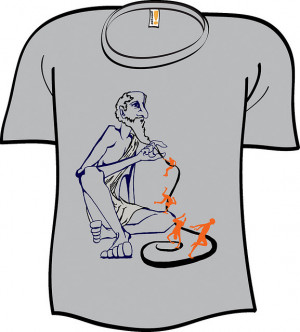
Why? Because Diogenes believes following arbitrary rules – in this case, urinating and defecating behind closed doors – is far less important and meaningful than following nature ( physis).Īccording to the Cynics, living according to nature and not human-created customs ( nomos) is the highest form of wisdom.ĭefecating isn’t considered shameful in private, so there’s no reason that it should suddenly be considered shameful in public. For example, he sees nothing wrong with going to the toilet in public. Diogenes has no regard for societal convention. Indeed, one of the reasons that his behavior shocks us is because of how much it questions the unspoken rules that we adhere to everyday. Cynics Believed That Nature Was More Important Than Custom Statue of Diogenes in Sinope, via Wikimedia Commons.Ĭlearly Diogenes had a real problem conforming to society’s rules. In this example, Diogenes was criticising society’s unspoken role that sexual acts should only be performed behind closed doors.Ĥ. As we will see, living life in accordance with nature means freeing oneself from any kind of public convention. So it’s not hard to see why Cynicism has gained a reputation for eccentricity. This is one of many shocking anecdotes that later philosophers and historians told about Diogenes. When someone approaches him and asks what on earth he’s doing, he replies “I wish it was as easy to relieve hunger by rubbing an empty stomach.” A disheveled-looking man appears in the crowd, lifts up his robes and starts pleasuring himself in plain view of everybody else. Diogenes and the Cynics quickly earned themselves a ‘dog-like’ reputation by putting these beliefs into practice.įor example, imagine a busy marketplace in Athens, circa 340 BC. Cynics were also strongly opposed to social conventions such as laws and customs. This could only be achieved by living in accordance with nature and embracing ascetic practices. Cynics believed that the main goal of life was eudaemonia or mental clarity. Throughout his life, Diogenes practiced Cynic values.

Diogenes of Sinope and the Cynics Lived in Accordance with Nature Diogenes looking for an honest man by Jacob Jordaens, 1642, via Douwes Fine Art. So who exactly were the Cynics? And what did they believe?ģ. Unsurprisingly, Cynicism has gained a reputation for eccentricity ever since it first appeared in Ancient Greece. The Cynics lived ascetic lifestyles, often dwelling in the streets and engaging in public defecation, much like dogs. While there’s some debate about why the Cynics adopted this name, many academics believe that the word was hurled at Cynic philosophers due to their bizarre and unconventional behavior. The word ‘cynic’ derives from the Ancient Greek kynikos meaning ‘dog-like’ or kyôn (dog). Like many words, cynicism has evolved over thousands of years to mean something very different to its original use. Back then, it referred to philosophers with a very specific set of beliefs (which we’ll explore in more detail below). The word derives from Cynicism, a school of philosophy which first appeared in Ancient Greece. In fact, the word ‘cynical’ has long and ancient etymological roots. In other words, if somebody describes you as cynical, then it isn’t really much of a compliment! However, the term hasn’t always carried such negative overtones. Today, the term ‘cynical’ means something along the lines of ‘motivated by self-interest’ and/or ‘mistrusting of people and their intentions’. The Meaning of the Term ‘Cynicism’ Has Changed Over the Centuries Alexander visiting Diogenes, late 18th–early 19th century, author unknown, via the Met Museum. The four walls and roof of a regular house were luxuries he could easily forego.Ģ. He found a large clay wine jar to shelter inside and quickly realized that he could live in the jar quite comfortably. But when the friend failed to respond to his letter, Diogenes simply roamed the streets. He was banished from the city for defacing coins, and arrived in Athens with no prospects and nowhere to stay.Īccording to one source, Diogenes wrote to a friend of his and asked if they knew of any available accommodation in Athens. He was supposedly one of Antisthenes’ first pupils, eventually dedicating his entire life to the practice of Cynicism.ĭiogenes began this process when he first arrived in Athens after being exiled from his home town of Sinope (a coastal city in modern day Turkey).

Diogenes was likely born around 404 BC and died in 320 BC. Only a few scraps of information exist today, but we can still piece together some of his biography. Most of what we know about Diogenes comes from later philosophers who didn’t know him during his lifetime. Diogenes of Sinope Was a Strange Man Diogenes by John William Waterhouse


 0 kommentar(er)
0 kommentar(er)
